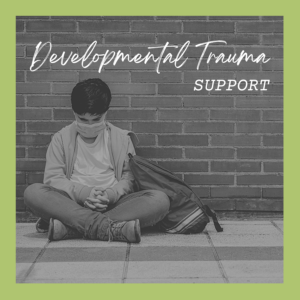Support for Developmental Trauma in Childhood

Adults impacted by adverse childhood experiences (ACES) with exposure to toxic stressors in childhood such as physical or sexual, emotional abuse, neglect, mental illness or substance abuse of a caregiver, separation from a caregiver, or violence in the home may be especially struggling with managing their children’s emotional and behavioral challenges. A large portion of a child’s brain-architecture is shaped within early development within the first three years; therefore children who have been impacted by early neglect and abuse are prone to demonstrate more serious cognitive impairments and struggle with language, academics, behavior, and peer relationships.
A parent or caregiver may first seek help from a specialist for a variety of concerns related to development, mental health, or behavior. Skill development looks different, depending on the child’s age and stage in development. Examples include speech-language development, cognitive skills, and motor skills in addition to social and emotional development. Some children struggle to meet the same developmental milestones as their same-aged peers while others meet skills early or may display scattered development. Children are still learning how to navigate their world, communicate their wants and needs, and learning how to solve problems. They are learning words for their emotions and may have a limited vocabulary and coping skills.
Some children may regress, especially in response to stress and when feeling overwhelmed and lacking appropriate coping skills to handle the situation. Regressive behaviors such as talking like a baby, whining, bedwetting, and tantrums can occur commonly in childhood, but adults can also exhibit these behaviors. Regression may show up as crawling into a fetal position in response to distressing news or taking out anger while driving as part of “road rage”. An adult with regressive behavior may appear to act much younger than their stated age due to displaying behaviors that are considered immature or not age appropriate. Adults children and with developmental trauma often benefit from trauma interventions that address complex trauma from repeated exposure to toxic stressors. Play is an important modality in which children learn about themselves, therefore, play therapy or incorporating play is a great option for children.
Regarding early childhood development, there are several things to keep in mind in addition to genes and environment. This includes the importance of positive, responsive relationships and early intervention.
Children with delays in development often require a multi-disciplinary team to address various aspects of development. Working with your pediatrician, therapist, school support, or case manager can help facilitate connections. The good news is that children (and adults) can learn new skills. Since the relationship is one of the key factors in helping children be able to adapt and thrive, active involvement in your and your child’s services makes a huge difference.
CARE Counseling has a team of trauma-informed mental health specialists who have experience working with toxic stressors that impact adults, children, and families.
https://care-clinics.com/care-for-my-child-twin-cities-children-counseling/
https://care-clinics.com/care-for-myself-twin-cities-counseling/
https://care-clinics.com/care-for-my-family-twin-cities-family-counseling/
Written By: Charlotte Johnson, MA, LPCC
We’re Here to help
Our wellness experts will be happy to take care of you. You can CLICK HERE to schedule an appointment now or call (612)223-8898.
Meet Clinicians
We’re united by our commitment to providing effective, relevant, and innovative mental health support at all stages of your journey. Click Here to find a therapist or find out more about who we are, where we come from, and how we live out CARE’s mission every day.
The professionals at CARE are actively collecting and creating resources to help with what you need and address frequently asked questions. We’re Here for You.
source https://care-clinics.com/support-for-developmental-trauma-in-childhood/
No comments:
Post a Comment